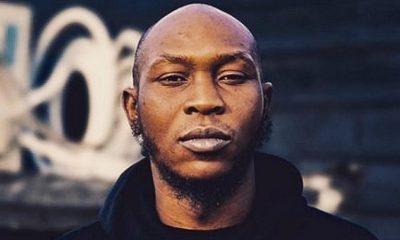News
Father confused over two-year-old son’s DNA result

By Kayode Sanni-Arewa
A man, Stephen Moses, has raised concerns after paternity tests revealed that he is not the biological father of his two-year-old son (names withheld).
Moses said he had not been able to get over the revelation of his supposed child having a sickle cell genotype when he has an AA genotype while his wife is AS.
The man said that he felt the need to confirm the boy’s paternity following the child’s several battles with sickle cell.
He revealed this while appearing on a popular television programme, The Justice Court, saying two different tests confirmed that he is not the biological father of Teri-Oluwa
In a series of tweets on his X handle on Monday where he tagged a now-viral video of the court session, Moses wrote, “I am still in awe of how we got here. We got married precisely May 21, 2016. A year down the line she got pregnant and gave birth on her birthday November 8, 2018. The first crisis the baby had, we spent thousands in hospital and that’s when we first discovered he was SS.
“At this point, I was confused. She first told me it was the enemy that was doing us through the boy. I didn’t believe and at the same time, I didn’t argue with her. I started doing my research if it was possible for AA + AS to produce SS.
“I saw some rare occasions of extreme weather conditions but it wasn’t possible in Nigeria as a result of good weather. I spoke to a few counselors and midwives in Ifako General Hospital and Lagos State Teaching Hospital.
“We kept on living together and we kept praying and fasting and nothing changed. The boy kept on going through crisis. At this point, we were already out of cash and could not afford a DNA test because I was already uncomfortable having confirmed from many sources that it was impossible.
“For me to produce SS even when I marry SS as an AA. So I started voicing my displeasure out to my friends and one of them pointed me to Justice Court that they will do the DNA test for free. So I contacted them and arranged a sample for me and the boy for the paternity test.
“Paternity test results came out in December and we had a court session where it was unveiled as seen in the video. Since December, she has been dodging and refusing to pick up calls from the Justice Court to carry out the Judge’s verdict to run a maternity test.”
He stated further that before the paternity was proven, his in-laws arrested him claiming he had not been providing upkeep for the child, adding that the story changed when the result of the test came out negative as his wife had been unreachable.
“So, as I write this story, Justice Court has not been able to reach her over the phone. She is not picking up calls. One funny thing in all this is, in November last year, her family got me arrested at Ajuwon Police Station because I was not dropping upkeep for the said child.
“It took the intervention of our family lawyer to get the case out of the police station. I remember the police were supporting her. In December, DNA results came out and it was negative. The need to clear herself arose and she went into isolation,” he stated.
On the possibility of the child being swapped at birth, Moses said it was slim as he was present in the labour during the birth.
He noted, “The above video shows the last part that says ‘Is the child swapped in the hospital?’ It may be possible but the chances are slim. I was present in the labour room and there were only two women in labour that day. It wasn’t a hospital, it was Ojodu Health Centre at Gbadamosi, Ojodu.
“The other woman already gave birth while she was in labour. I remember following the nurse to clean him up and collect him back, dropping him beside her on the bed and waiting for her sister to come and then I left to cook something for her. Honestly, this marriage wrecked me.”
The wife, while reacting in the video, said Moses’ story was true but disagreed with the results.
In her defence, she said that Moses did not discuss it with her before carrying out the DNA test.
She said, “All that is said is true but when we were first diagnosed, why couldn’t he tell me that we should go for DNA? And meanwhile, he didn’t even come out straight that he wanted to do a DNA test. He started misbehaving in the house and sometimes he wouldn’t even come home until my brother said I should let him know whenever my husband was around.
“One he was around and my brother came and that was when he said what was happening because I didn’t know anything. So, he told me that his father dreamt that he was nursing another man’s child and that was the excuse he gave me that day and it went on like that.”
When asked who the father of the child was, the wife replied, “Nobody touched me. I’m very sure.”
News
VeryDarkMan: NGO condemns arrest, maltreatment of activist

The Centre for Credible Leadership and Citizens Awareness, has condemned the manner in which Martins Otse, popularly known as VeryDarkMan was arrested and maltreated by the EFCC.
In a statement issued and signed on Monday by its Director General, Dr
Nwambu Gabriel noted that:
“We are compelled to issue this press statement in response to the distressing reports surrounding the recent arrest of human rights activist Martins Ortse, popularly known as VeryDarkMan (VDM), by the Economic and Financial Crimes Commission (EFCC).
The manner in which VDM was apprehended and treated is not only unacceptable but reflects a disturbing trend of impunity and abuse of power that undermines the human rights of Nigerian citizens.
VDM’s arrest, reportedly executed in a manner reminiscent of a military-style operation, stands as a stark violation of his basic human rights. Accounts of his treatment—being blindfolded, subjected to physical assault, and detained without adherence to lawful arrest procedures—are deeply troubling and invoke the principles enshrined in the Nigerian Constitution and international human rights laws. These actions are not merely procedural errors; they represent a fundamental disregard for the rule of law and human dignity.
*Key Concerns:*
1. *Violations of Human Rights*: The treatment meted out to VDM—torture, humiliation, and unlawful detention—contradicts fundamental rights guaranteed under the Nigerian Constitution, particularly the right to dignity, liberty, and fair hearing. Such actions are incompatible with both the Administration of Criminal Justice Act (2015) and international legal standards.
2. *Lack of Justification for Arrest*: The EFCC has failed to provide any legal justification for the reported actions against VDM. It is essential to remember that no individual is to be punished without due process. If the EFCC has evidence of wrongdoing, they must adhere to legal protocols and ensure that VDM is charged in a court of law, affording him the opportunity for defense.
3. *Repercussions on Nigeria’s Global Image*: The actions of the EFCC in this case potentially disgrace Nigeria on an international level. Such behavior can undermine the country’s reputation and portray it as a place where dissent is met with repression rather than dialogue. The importance of upholding human rights cannot be overstated in preserving Nigeria’s standing in the community of nations.
In light of these grave concerns, we call upon the Economic and Financial Crimes Commission to take immediate action by:
1. *Releasing Martins Ortse (VeryDarkMan) forthwith* if there are no formal charges against him.
2. If charges exist, the EFCC must promptly charge him in a competent court, ensuring that all legal rights are upheld and that he receives just treatment in accordance with the law.
3. Ceasing all forms of intimidation and harassment against individuals who engage in constructive criticism or activism, as this undermines the democratic values that Nigeria purports to uphold.
The Centre for Credible Leadership and Citizens Awareness stands firmly against any form of dehumanization and violence perpetrated against citizens, particularly those exercising their fundamental rights to freedom of expression and assembly. We urge the EFCC to rectify the current situation, display accountability, and restore faith in the institutions meant to serve the Nigerian people.
Sincerely,
Nwambu Gabriel, Ph.D.,
Director General
Centre for Credible Leadership and Citizens Awareness
News
Nigeria Targets Electricity Access for 300 Million Africans by 2030 – Speaker Abbas

By Gloria Ikibah
Speaker of the House of Representatives, Rep. Tajudeen Abbas has said that Nigeria is taking a frontline role in the push to expand electricity access across Africa, to help power about 300 million people on the continent by 2030.
The Speaker disclosed this while delivering the keynote address at the First Legislative Conference and Expo on Renewable Energy, organised by the House Committee on Renewable Energy, in collaboration with the United Nations Development Programme (UNDP) held in Lagos on Monday.
The conference brought together lawmakers, industry stakeholders, and development partners to explore renewable energy solutions and legislative frameworks for boosting access and affordability.
Abbas praised President Bola Tinubu’s approval of a $1 billion funding package for Nigeria’s Rural Electrification Agency in December 2024, and described it as a major boost for energy inclusion.
According to him, Nigeria’s participation in the Mission 300 initiative, a joint effort with the World Bank and African Development Bank demonstrates the country’s growing commitment to clean, sustainable energy for underserved communities.
He said: “This initiative speaks to Nigeria’s readiness to lead by example on the continent. It is about more than power, it is about development, opportunity, and progress.
News
Court delivers another judgement in favor of Amaewhule, others on Rivers Assembly crisis

By Kayode Sanni-Arewa
A Federal High Court in Port Harcourt has dismissed a case brought by lawmakers loyal to Rivers State Governor Siminalayi Fubara, challenging the positions of 27 State House of Assembly members that defected from the Peoples Democratic Party (PDP) to the All Progressives Congress (APC).
The ruling was delivered by Justice Emmanuel Obile, who explained that the lawmakers, led by Speaker Martins Amaewhule, remain valid members of the House.
This follows an earlier Supreme Court decision in February that had also refused Governor Fubara’s push to remove the defected lawmakers.
Governor Fubara’s legal team, headed by Yusuf Ali, had already withdrawn the appeal at the Supreme Court, stating that new developments had overtaken the matter.
The Rivers Assembly, represented by Wole Olanipekun, did not oppose this withdrawal.
The case at the Federal High Court was filed by three pro-Fubara lawmakers — Victor Oko-Jumbo, Adolphus Orubienimigha, and Sokari Goodboy Sokari — who asked the court to declare the seats of the 27 lawmakers vacant since they left the PDP, the party under which they were elected.
But the court ruled that their defection did not break any constitutional rule that would force them out of office.
“This court cannot close its eyes to the binding precedent of the Supreme Court, which in February recognised the leadership of the Rivers State House of Assembly under Speaker Martins Amaewhule. That decision, being from the apex court, is final and conclusive,” Justice Obile ruled.
Speaker Martins Amaewhule reacted positively to the judgment, saying it confirmed their right to stay in the Assembly.
Meanwhile, Governor Fubara’s supporters were disappointed by the decision.
This ruling marks another chapter in the political struggle between Governor Fubara and the pro-Wike faction of the Assembly, a conflict that has been ongoing since the December 2023 defections.
For now, the pro-Wike lawmakers have secured some breathing room, even as tensions continue between both camps.
-

 News9 hours ago
News9 hours agoWhy ‘VeryDarkMan was arrested – EFCC
-

 News20 hours ago
News20 hours agoMassive turnout as Bishop David Abioye holds first service in new church + Video
-

 Economy20 hours ago
Economy20 hours ago75.5% of rural Nigerians now live below poverty line — World Bank
-

 Entertainment9 hours ago
Entertainment9 hours agoHow I narrowly escaped death in U.S hotel room – Seun Kuti
-

 Education12 hours ago
Education12 hours agoOver 1.5m candidates score less than 200 in 2025 – UTME
-

 News20 hours ago
News20 hours agoHow US-Based Yoruba Monarch Died After Brutal Assault In Oyo Palace, Allegedly Ordered By Alaafin Amid Supremacy Row With Ooni Of Ife
-

 News11 hours ago
News11 hours ago‘S3x is good, I enjoy it,’ Bishop Adejumo tells wives
-

 News19 hours ago
News19 hours ago‘Cabals’ still fighting against our refinery — Dangote






